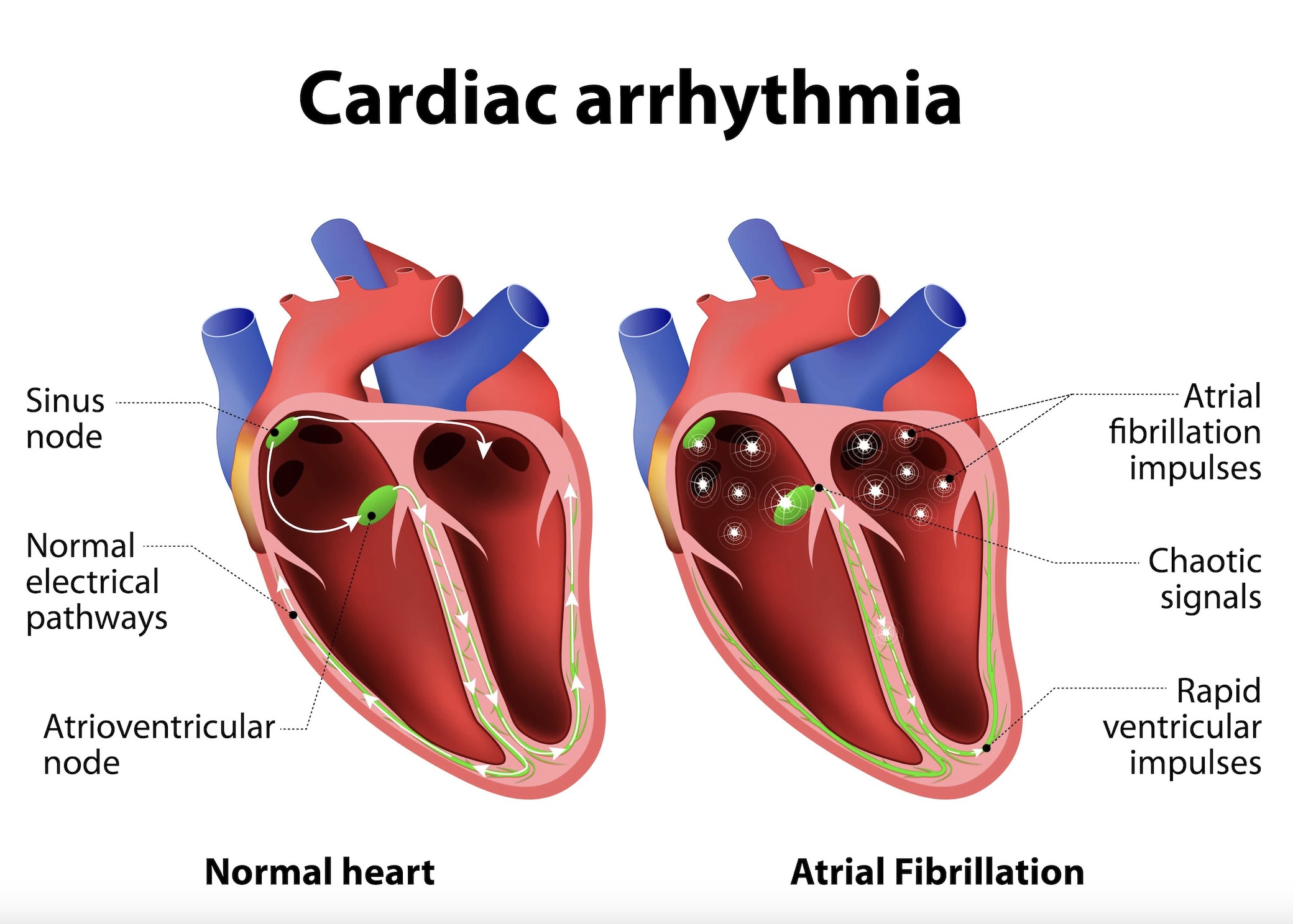Arrhythmia: Symptoms, Causes & Treatment
What are the symptoms of arrhythmia?
Arrhythmia refers to an abnormal heart rhythm, which can cause the heart to beat too fast, too slow, or irregularly. The symptoms of arrhythmia can vary depending on the type and severity of the condition, but some common symptoms include:
- Palpitations: A feeling of rapid, fluttering, or pounding heartbeats, which may feel like the heart is skipping beats or beating irregularly.
- Chest pain or discomfort: Some types of arrhythmia can cause chest pain, tightness, or pressure that may spread to the arms, neck, jaw, or back.
- Shortness of breath: Arrhythmia can cause difficulty breathing, especially during physical activity or when lying down.
- Fatigue or weakness: Irregular heartbeats can lead to decreased blood flow and oxygen delivery to the body’s tissues, causing fatigue or weakness.
- Dizziness or lightheadedness: Arrhythmia can disrupt blood flow to the brain, resulting in dizziness, lightheadedness, or feeling faint.
- Sweating: Excessive sweating, even without physical exertion, can sometimes accompany arrhythmia.
- Anxiety or panic attacks: The sensation of an irregular heartbeat can trigger feelings of anxiety or panic in some individuals.
- Syncope (fainting): In severe cases, arrhythmia can cause a temporary loss of consciousness or fainting due to decreased blood flow to the brain.
It’s important to note that some people with arrhythmia may not experience any symptoms at all, and the condition may be detected during a routine medical examination or diagnostic test.
Additionally, some symptoms like palpitations, shortness of breath, or fatigue can also be associated with other medical conditions, so it’s essential to consult a healthcare professional for proper evaluation and diagnosis.
If you experience persistent or severe symptoms that could indicate an arrhythmia, it’s crucial to seek medical attention promptly, as some types of arrhythmia can be life-threatening if left untreated.
What are the causes of arrhythmia?
Arrhythmia, or an abnormal heart rhythm, can be caused by a variety of factors. Some of the main causes of arrhythmia include:
- Heart disease: Conditions that affect the structure or function of the heart can contribute to arrhythmia, such as coronary artery disease, heart attack, heart failure, cardiomyopathy (thickened or stiffened heart muscle), and heart valve disorders.
- Electrolyte imbalances: Abnormal levels of electrolytes like potassium, sodium, calcium, and magnesium can disrupt the electrical signals that regulate the heart’s rhythm.
- Injury or scarring: Damage to the heart muscle from a heart attack, heart surgery, or other trauma can disrupt the electrical pathways and lead to arrhythmia.
- Congenital heart defects: Some people are born with abnormalities in the structure or electrical pathways of the heart, predisposing them to arrhythmia.
- Thyroid disorders: Both an overactive thyroid (hyperthyroidism) and an underactive thyroid (hypothyroidism) can affect the heart’s rhythm.
- Medications: Certain medications, such as antiarrhythmic drugs, chemotherapy agents, and over-the-counter decongestants, can potentially cause or contribute to arrhythmia.
- Stimulants: Excessive consumption of stimulants like caffeine, nicotine, or illegal drugs can trigger arrhythmia in some individuals.
- Sleep apnea: This condition, characterized by interrupted breathing during sleep, can increase the risk of arrhythmia.
- Stress and anxiety: High levels of stress or anxiety can sometimes trigger or exacerbate arrhythmia in susceptible individuals.
- Aging: As people age, the electrical pathways in the heart can become less efficient, increasing the risk of arrhythmia.
In some cases, the cause of arrhythmia remains unknown, a condition known as idiopathic arrhythmia. Identifying and addressing the underlying cause, if possible, is important in managing and treating arrhythmia effectively.
What is the treatment for arrhythmia?
The treatment for arrhythmia (abnormal heart rhythm) depends on the type of arrhythmia, its underlying cause, and the severity of symptoms. The main goals of treatment are to control the heart rate, restore a normal heart rhythm, and prevent complications. Here are some common treatments for arrhythmia:
- Medications:
- Antiarrhythmic drugs: These medications can help control or prevent abnormal heart rhythms by regulating the electrical activity of the heart. Examples include amiodarone, sotalol, and flecainide.
- Anticoagulants (blood thinners): For certain types of arrhythmia, such as atrial fibrillation, anticoagulants may be prescribed to reduce the risk of blood clots and stroke.
- Other medications: Beta-blockers, calcium channel blockers, and digoxin may be used to control the heart rate or treat underlying conditions contributing to the arrhythmia.
- Cardioversion:
- Electrical cardioversion: This procedure delivers a controlled electric shock to the heart to restore a normal heart rhythm.
- Pharmacological cardioversion: Certain medications are given intravenously to attempt to reset the heart’s rhythm.
- Catheter ablation:
- In this procedure, a catheter (thin, flexible tube) is inserted into the heart through a blood vessel, and energy is used to scar or destroy the area of heart tissue causing the abnormal rhythm.
- Implantable devices:
- Pacemakers: These small devices are implanted under the skin to control abnormally slow heart rhythms (bradycardia) by delivering electrical impulses to the heart.
- Implantable cardioverter-defibrillators (ICDs): These devices can detect and stop dangerously fast heart rhythms (tachycardia or fibrillation) by delivering electrical shocks to the heart.
- Surgery:
- In some cases, surgery may be recommended to treat underlying heart conditions contributing to the arrhythmia, such as coronary artery bypass grafting, valve repair or replacement, or maze procedure for atrial fibrillation.
- Lifestyle changes:
- Avoiding triggers: Limiting or avoiding substances like caffeine, alcohol, and certain medications that can trigger arrhythmia.
- Managing underlying conditions: Treating conditions like thyroid disorders, sleep apnea, or electrolyte imbalances that may contribute to arrhythmia.
- Stress management: Practicing relaxation techniques, exercise, and stress-reduction strategies.
The choice of treatment depends on factors like the type of arrhythmia, underlying causes, age, overall health, and individual preferences. In some cases, a combination of treatments may be necessary to effectively manage the arrhythmia and reduce the risk of complications.




